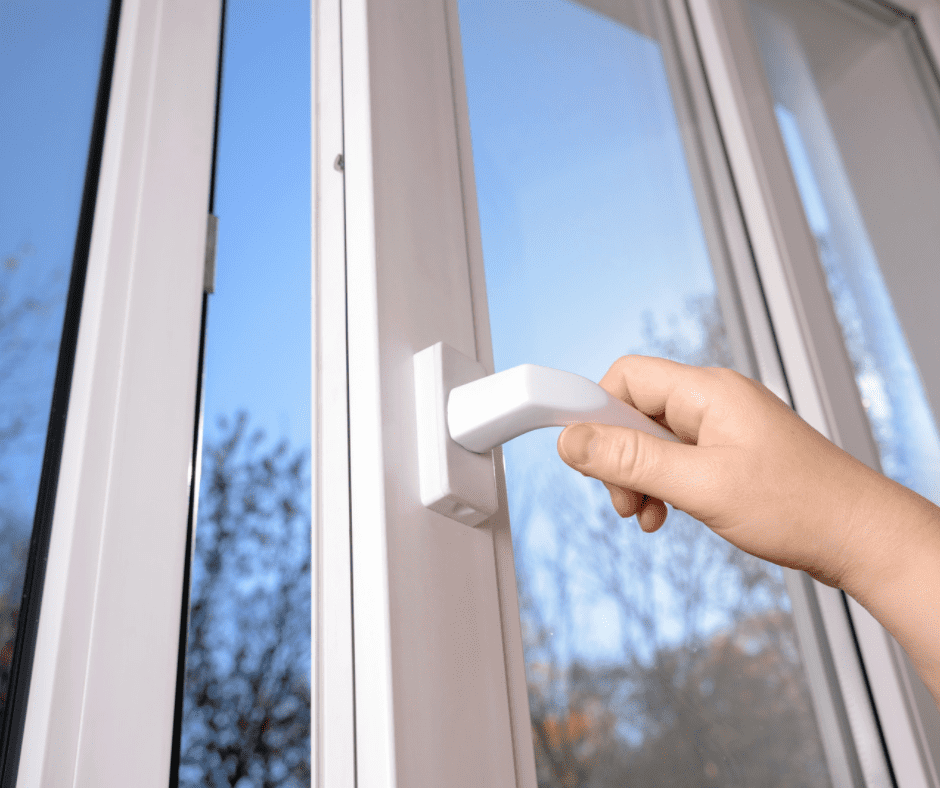Life might be better in the summer, but during the dog days of July and August, sleeping isn’t always. The air is so thick you’ll be tossing and turning while the sweat beads up on your skin.
One way to help the air circulate in your home is to open your windows and run a fan. It won’t cool your living space, but it will get the air moving and that might make you feel cool enough to get in a few hours of sleep.
But, at what point is the air too humid for an open window to do any good? Is there a point where you might as well close the window and wait for a storm to break the heat?
In This Article We'll Discuss
When Is It Too Humid to Open Windows?

Some like it hot. It’s not just the name of a movie, it’s also a basic reality. Some people just prefer warmer, stickier air, and some people prefer things on the cool side. The first answer to when it’s too humid out is a matter of personal preference.
We can’t answer that question, but we can help guide your decision with a little added information.
Keeping your windows closed during humid weather is going to be most effective if you have air conditioning. If you don’t, it might be necessary to keep your windows open even when the humidity is at its worst just to keep the air circulating.
It might make basic sense to use relative humidity as a guide for when you want to open your windows. Most people are pretty comfortable when relative humidity is below 40 percent. If you’re curious, you can purchase a hygrometer, which measures temperature and humidity.
However, there is a different measurement you can use to determine whether you should open your windows: Dew point. One drawback to relative humidity is that it doesn’t account for temperature, which influences the amount of moisture in the air.
Air expands as it warms, which in turn means it can hold more moisture. Air at 80 degrees Fahrenheit holds more water vapor than air at 55 degrees Fahrenheit, and that isn’t measured by relative humidity.
Dew point temperature – the point at which water vapor in the air starts to condense and form dew – accounts for both temperature and humidity. So, that makes it a more useful comparison when looking at cooler air outside versus warmer inside air.
While there are math equations that would help you calculate dew point temperature, for most people it’s better to have a simple reference chart.
When Should You Open Your Windows Based on Humidity Levels?

Knowing when to open your windows based on how humid it is outside is more complicated than knowing the relative humidity inside and outside your home. You also need to account for temperature.
Warmer air holds more moisture. So, air that is 55 degrees Fahrenheit at 55 percent relative humidity feels less damp than air that is 75 degrees Fahrenheit at 50 percent relative humidity.
The correct reading you’re looking for is dew point temperature, which is the point at which air has cooled enough to condense and form dew. It represents where air hits its saturation point and can hold no more water.
While you could use a complicated formula to measure dew point temperature, we recommend consulting an online chart as a quick reference guide.
If the dew point temperature outside is lower than what it is inside, opening a window and letting in air will actually lower your home’s relative humidity. That is what happens when cooler air gets warmer and expands and starts to absorb more water vapor.
The more air circulation you have this way, the faster your ambient relative humidity will start to even out between inside and outside. You’ll find the temperature starts to drop, too. So, be careful if it’s a humid fall day.
Is It Better to Use an AC Unit or to Open Windows?

Whether to use an air conditioner or to open your windows comes down to a couple of matters of personal taste. Do you prefer warm fresh air or cooler conditioned air, and how much money are you willing to spend?
You’ll also want to factor in where you live. It’s generally preferable to keep an air conditioner running once you’ve turned it on. So, if you live where summers are relatively short and cooler, you might want to keep your windows open longer.
It’s a different matter if you can’t stand feeling sticky or if your sleep is easily impacted by humid air. The quality of your sleep is so important to your health and general happiness that it should take priority in the choice to open a window or run AC.
Will Opening Windows Help Reduce Humidity and Dampness?

Opening a window on a humid day doesn’t necessarily mean that the air in your home will get stickier and less comfortable. Relative humidity can tell you a bit about how damp the air will feel, but temperature plays an important role.
Air expands as it gets warm and, as it expands, it can hold more water vapor. Relative humidity of 60 percent at 60 degrees Fahrenheit will feel less sticky than the relative humidity of 60 degrees at 80 degrees Fahrenheit because of that.
A more accurate measurement to determine how the air will feel is dew point temperature, which is where the air is saturated with water vapor and condenses into dew on surfaces like buildings and grass.
The higher the dew point temperature, the more humid the air will feel. You can calculate dew point temperature based on a hygrometer’s readings, but it’s probably easier to just consult an online chart.
If the dew point is higher inside than outside, it’s safe to open a window. It will help dry out the air a little bit as the outside air mixes with the inside air. If the dew point temperature inside is lower than what it is outside, keep your windows closed.
Conclusion
Knowing when it’s too humid outside to open a window is an important piece of information in keeping your home comfortable. Humid air makes anything beyond sitting in a chair a sweaty chore and can make getting decent sleep almost impossible.
Opening a window can help circulate air if you don’t own an air conditioner, but you might also want to keep it shut if you want to keep the humidity outside. We recommend using dew point temperature as the most accurate way to know when it’s too humid out to open your windows.
We’d love to hear about what you’ve learned in a comment down below. You can also share your own experiences with humid air and open windows. Feel free to share this article on your social media networks as well.

